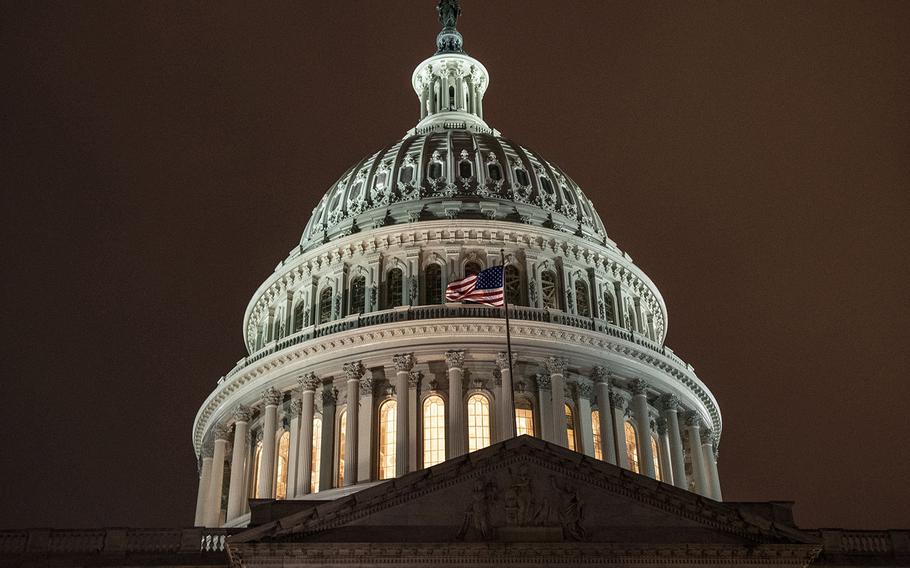
The U.S. Capitol. (Stars and Stripes)
WASHINGTON — Congress approved a bill Wednesday that increases resources for homeless veterans, creates a Department of Veterans Affairs advisory committee for Native American veterans and mandates that every VA hospital hire a dedicated women’s health provider, among dozens of other measures.
The legislative package, which lawmakers described as an end-of-year omnibus bill for veterans, is over 340 pages long and includes numerous provisions for female veterans, Native American veterans, homeless veterans, student veterans, veterans experiencing the effects of toxic exposures and those affected by the coronavirus.
Following the Senate’s approval last week, the House passed the bill Wednesday afternoon by voice vote without any objections. It now heads to President Donald Trump’s desk for his signature. The vote comes as Congress is wrapping up its 116th legislative session.
“This is the culmination of two years of bipartisan work,” Rep. Phil Roe, R-Tenn., said on the House floor Wednesday. “There is something in this bill for just about every one of our nation’s veterans and their loved ones.”
The bill is named for Roe, who didn’t seek reelection this year, and Sen. Johnny Isakson, R-Ga., who resigned from the Senate at the end of 2019. Both men were leaders on the Senate and House veterans’ affairs committees.
“I’m proud that one of my last votes of Congress will be in support of this bill, and I’m also humbled it bears my name and that of my friend,” Roe said. “Helping to serve my fellow veterans in Congress these past 12 years has been the honor of a lifetime.”
In an effort to improve services for women veterans, the bill creates a dedicated Office of Women’s Health at VA, provides $20 million to retrofit VA hospitals with women’s health spaces and makes permanent a program to provide childcare at VA facilities, among other measures.
Women are the fastest-growing demographic in the military, with the number using VA health care almost tripling since 2000, from 160,000 to 475,000, according to VA data. Veterans’ advocates have criticized the department for being slow to adapt to treating more women.
One piece of the bill aims to prevent sexual harassment and assault at VA facilities. It would require the department to create an anti-harassment and anti-sexual assault policy and designate someone at each VA facility to receive reports of harassment. A working group will be created to help implement the policy.
Rep. Mark Takano, D-Calif., chairman of the House Committee on Veterans’ Affairs, said the measure was timely. He noted a VA Office of the Inspector General report last week that found VA Secretary Robert Wilkie and other senior VA officials ignored problems of sexual harassment at the Washington DC VA Medical Center and attempted to discredit the credibility of the woman who reported an assault. Takano, as well as many other Democrats and national veterans’ organizations, have since called for Wilkie’s resignation.
“Women are the fastest growing demographic in the veteran community, and the VA must be prepared to welcome them,” Takano said on the House floor Wednesday. “[The report] emphasized the need to address a toxic culture.”
The bill also aims to help veterans suffering from military sexual trauma. In 2018, the VA Office of Inspector General reported that the department wrongfully denied benefits to thousands of veterans who filed claims for military sexual trauma – rejection that potentially caused stress and psychological harm, the IG said.
The legislative package would require teams who specialize in military sexual trauma to process those benefits claims. It would also allow veterans who must be examined during the claims process to choose the sex of the medical provider examining them.
House Speaker Rep. Nancy Pelosi, D-Calif., said the measures for female veterans were the “crown jewel” of the omnibus bill, which she described as the “most comprehensive bill for women veterans in over a decade.”
In addition to women, the package contains dozens of measures to aid student veterans, including more protections against for-profit colleges and a restoration of education benefits to students whose colleges closed or were disapproved by the VA. The bill also works to ensure veterans’ education benefits aren’t negatively affected by fallout from the coronavirus pandemic.
A few provisions offer help for veterans affected by the coronavirus. The bill would ease the process for organizations that aid homeless veterans to receive grant money from the VA. The money would be used to help renovate shelters and help veterans get into housing.
The bill also requires state-run veterans’ homes to regularly report to the VA about their coronavirus cases and deaths. The homes, which are operated by states but overseen by the VA, currently do not report information about their coronavirus cases to the department, and it’s uncertain how many residents of those homes have died. Many of the homes have experienced deadly coronavirus outbreaks.
Additionally, the bill gives eligibility to VA benefits for service members who have contracted the coronavirus on military duty.
The package also made strides for Native American veterans by prohibiting the VA from charging them copayments and by creating an advisory committee that will advise the VA secretary about the unique challenges facing tribal veterans.
Sen. Jerry Moran, R-Kan., the leader of the Senate Veterans’ Affairs Committee, said the bill would “impact every corner of the veteran community.” Sen Jon Tester, D-Mont., the ranking Democrat on the committee, said it “sends a clear message that Congress is willing to come together to do what’s necessary and follow through on our responsibility to support all veterans.”
The bipartisan bill was backed by several national veterans’ organizations. Iraq and Afghanistan Veterans for America pushed Congress to approve the measures for women veterans for nearly four years.
Jeremy Butler, CEO of IAVA, said Wednesday said the bill was “groundbreaking” and would help close many gaps in care for female veterans.
wentling.nikki@stripes.com Twitter: @nikkiwentling